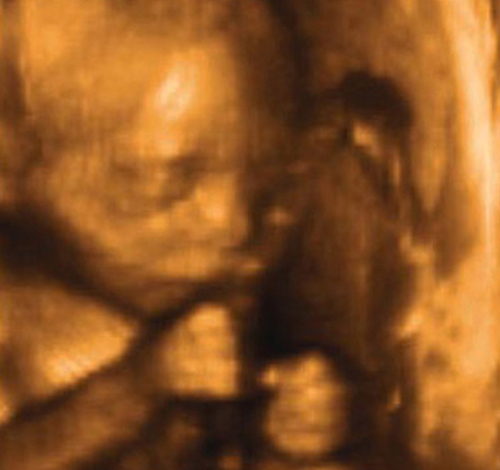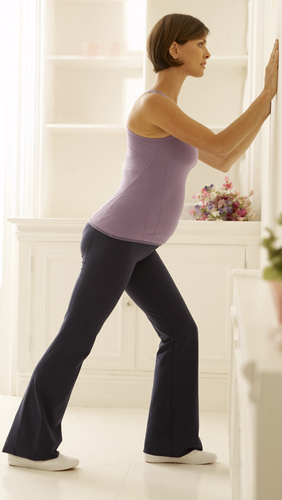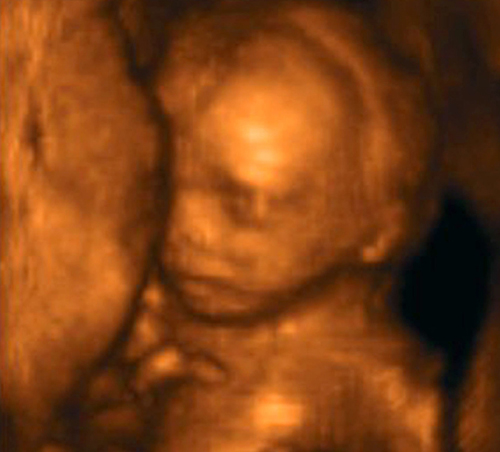You are 19 Weeks and 4 Days 143 days to go…
The foundations are already laid for your baby’s teeth—both the milk teeth and the permanent ones that will follow.
Your baby today
The appearance of your baby’s head is still dominated by a
prominent forehead due to the rapidly growing brain. The jaw can seem
small but as the toothbuds grow and expand within the jaw, it lengthens
and changes proportion.

Although it’s very rare for any teeth
to have come through by birth (only a 1 in 3,000 chance), your baby’s
tooth buds that will form her teeth are already in place within the
jawbone.
All of your baby’s
teeth—both her “milk” teeth and her underlying permanent teeth—start
their development beneath the gums while she is developing in your
uterus. The milk teeth buds began to develop at eight weeks of pregnancy
and by this week all of the buds are formed.
The first milk teeth to
harden, as calcium builds up, are the central incisor teeth and the last
are the back molars, at around 19 weeks. The crown of each milk tooth
does not complete development until after birth and root completion
takes until your child is more than three years old.
Buds for the
permanent teeth begin to form between the 14th and 20th weeks. These lie
deeper than those for the milk teeth and closer to the inner edge of
the jaw and gum. They remain dormant until it is time for the milk teeth
to be lost.
Your baby’s milk
teeth will start coming through at around six to eight months and she’ll
have a complete set of milk teeth by the age of 21/2.
Fetal alcohol syndrome leads to serious oral and dental problems in the baby.
Smaller teeth that have weak enamel is just one of the many unfortunate consequences of this condition.
Feeling flexible
Stretching and flexibility exercises
should be a regular part of your fitness program at all times, but
especially during pregnancy. Being flexible enables your muscles to work
more efficiently, alleviates tightness, helps prevent cramping, and
leads to improved balance and posture. Stretching can also help you feel
confident and calm, especially if the exercises are combined with deep
breathing.
Flexibility can be
maintained or improved during pregnancy by doing a series of exercises
that stretch your muscles in a safe and effective way.
To stretch your calf,
lean against a solid support. Keep your front leg bent and straighten
the other leg behind you for 20 seconds. Repeat with the other leg.

Do not stretch further than feels comfortable or you risk injuring the ligaments and stressing your joints.
Ensure that you’re stretching when the muscles are warm, at the end of a workout or after a warm bath.
During
the second and third trimester you should avoid any
exercises—stretching or otherwise—that require you to lie on your back
for extended periods.
You are 19 Weeks and 5 Days 142 days to go…
As the weeks go by, you’ll find that you’ll need to rest more and limit the amount of time you are on your feet.
Your baby today
Your baby often rests against the placenta. This has no effect
on the placenta since its surface is protected by the amniotic sac and
its composition and blood flow maintain its circulation at all times,
leaving your baby free to explore her environment.

By this stage, you may find it tiring
to be on your feet for long periods of time. For one thing, the growing
weight of your baby and uterus will lead to discomfort, and potentially
to muscle strain. Because your center of gravity is shifting, too, you
may find that you stand awkwardly, putting pressure on your ligaments,
which are, themselves, softened due to hormonal changes (see Stretching safely). What’s more, prolonged standing can cause blood and other fluids to pool in your legs, which can cause pain and dizziness.
If possible, take short,
frequent breaks, so that you can put your feet up. If you do have to
stand for long periods, you may find that resting one foot on a stool or
box from time to time can help. Make sure your shoes offer good support
(see On your feet), and consider wearing maternity hose.
It’s important not to
stand for more than three hours at a time, so if your work involves
standing make sure you are given adequate breaks.
Being out and about will make you tired. When you’re going out for the day, plan lots of breaks so you can sit and rest.

… Doctor
| Q: |
The bigger I get, the more difficult it’s becoming to have sex. What should we do?
|
| A: |
As your pregnancy continues, you will have no choice but to
try new sexual positions that will more easily accommodate your growing
belly.
You can still use the
missionary position but your partner may have to support his weight on
his hands instead of lying on you; that way he won’t press on your
belly. However, you’ll find that positioning yourself on top is a better
alternative, and as your belly gets bigger you can squat or kneel over
your partner. Side-by-side or rear-entry positions are also comfortable
during pregnancy. Have fun experimenting to find out what’s right for
you.
|
… Your baby
That’s tasty!
The flavors from the foods you eat
will be transferred to the amniotic fluid, which is swallowed by your
baby in the uterus. Therefore the types of food you eat can influence
your baby before her first exposure to solid foods.
Studies show that prenatal
and postpartum (through breast milk) exposure to a flavor enhances a
baby’s enjoyment of it in solid foods. These early flavor experiences
may provide the foundation for healthy choices, as well as explain the
cultural and ethnic differences in cuisine. So get your baby started on
the road to good food choices by making healthy selections now.